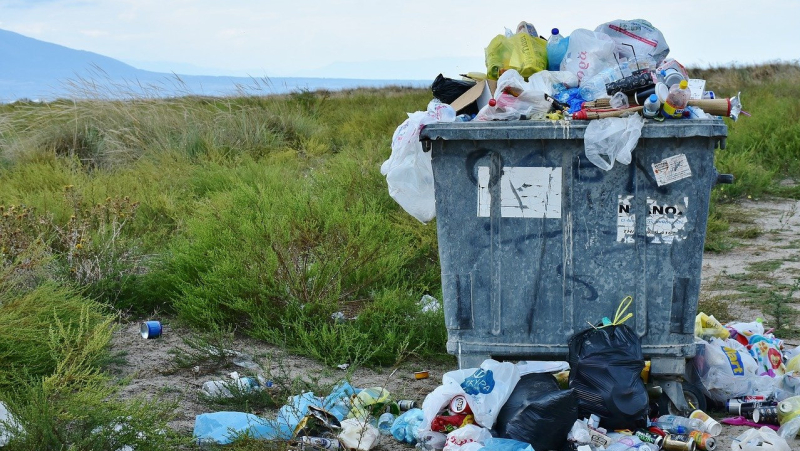EUR 146 billion for trash? How banks and the plastics industry are forcing a global environmental catastrophe
Thomas Küchenmeister, Managing director Facing Finance, +49 (0)175 4964 082
Renate Vacker, Press spokesperson Brot für die Welt, Telefon + 49 (0)30 65211 1833
Barbara Wiegard, Press spokesperson Bischöfliches Hilfswerk Misereor, + 49 (0) 30 4435-1988, Mobil + 49 (0) 171 3358887

Thomas Küchenmeister, Managing director Facing Finance, +49 (0)175 4964 082
Renate Vacker, Press spokesperson Brot für die Welt, Telefon + 49 (0)30 65211 1833
Barbara Wiegard, Press spokesperson Bischöfliches Hilfswerk Misereor, + 49 (0) 30 4435-1988, Mobil + 49 (0) 171 3358887
Top European banks, including Deutsche Bank and Commerzbank, are contributing massively to global plastic pollution through their billion-dollar investments and financing of the plastics industry, according to Facing Finance’s Dirty Profits report, launched today. None of the banks investigated in the report have a comprehensive plastic policy yet, either for chain of production or the consumer goods sector.
The report analyses the plastic-linked investment and financing behaviour of eight major European banks with financial relationships worth more than EUR 146 billion with plastic manufacturing or processing companies. In total since 2017 these banks have raised capital of around EUR 95 billion for companies investigated in the report, to finance their plastic-heavily business models. The banks with the most significant capital investments were HSBC, Deutsche Bank, BNP Paribas and Spain’s Santander. Banks also made investments totalling almost EUR 52 billion.
“Banks contribute to global plastic pollution, especially through their financing, and must finally embed in their policies a financial shift away from non-sustainable plastic-intensive business models”, demands Thomas Küchenmeister, Managing Director of Facing Finance and publisher of the report.
“The EU’s Sustainable Business Taxonomy provides guidance here. It classifies a company’s plastic production as sustainable, only if no more than 10 percent of the end products are single-use plastics or if at least 90 percent of the starting material is recycled. If financial institutions would make such a requirement the basis of their financing, a lot would already be gained”, explains Ute Straub, Ethical Investment Officer at Brot für die Welt.
The 14 companies investigated in the report, including raw material suppliers ExxonMobil and Shell, and also BASF and Ineos which synthesize the raw materials, contribute a significant share to global plastic pollution. All of these companies do too little to mitigate the environmental damage of this pollution.
“We demand ambitious and binding commitments from companies to significantly reduce their plastic consumption. The plastic processing industry must also comply with human rights and environmental due diligence obligations, as also provided in the recent draft of the supply chain law. Companies should also be liable for the damage caused by their plastic production and the use of the products – especially the extreme accumulation of microplastics in ecosystems”, says Dr. Klaus Schilder, an expert on responsible business at Misereor.
Eliminating plastic must remain the top priority, according to the report. “The international community must work for a binding treaty under international law to address the plastic crisis. In addition to a binding plastic pollution reduction target, the use of non-recyclable or difficult-to-recycle single-use plastic items and toxic additives should be restricted”, demands Vanessa Müller, Facing Finance project coordinator of the Dirty Profits Report.
The report calls for future incentives to avoid plastic, the introduction of reusable systems, and the capability of banks to financially support a circular economy and make it easier for consumers to consume packaging-free and sustainably.
Globally, single-use plastics total half of all plastics ever produced. Over almost 70 years approximately 8.3 billion tons of plastic has been produced, generating 6.3 billion tons of waste, of which only 9 percent was recycled and 12 percent incinerated. Almost 80 percent of plastic waste ends up in landfills in the open countryside.
The Dirty Profits report is funded by Brot für die Welt, Misereor, the Friedrich Ebert Foundation, the Kindernothilfe Foundation and the Swedish Development Agency Sida. Facing Finance is a non-profit and non-governmental association based in Berlin. It aims for a responsible and sustainable management of financial resources. Facing Finance calls on investors, financial service providers, banks and insurance customers to avoid investing in companies that violate human rights and environmental protection or companies that profit from corruption and the production of weapons that violate international law. The “Dirty Profits” report is published annually on a different focus topic.
The full report can be downloaded here.
Statements from the companies and banks studied can be found here.
